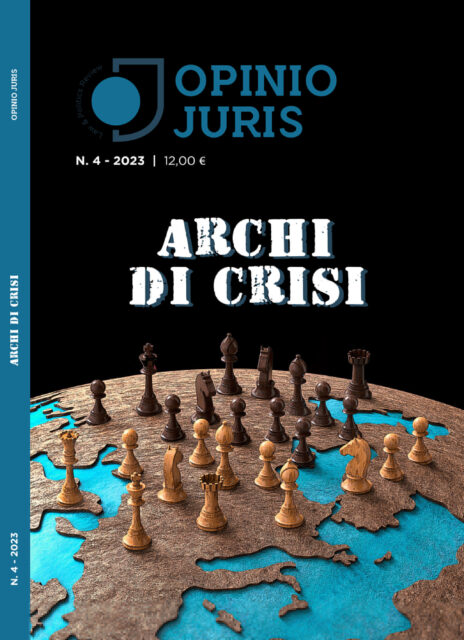
Author: Domenico Nocerino
When Pope Francis, in 2014, coined the expression “piecemeal Third World war”, he was capable of defining, almost ten years later, the image of today’s world in which the shocks of the transition to multipolarity are manifesting themselves with all their aggressiveness.
Russia’s invasion of Ukraine on February 24th, 2022, the war in Gaza that has been going on since last October, are just the latest numerous wars still going on around the world.
On some occasions, we can say that some wars are ‘lucky’ because they have an international media coverage, a spotlight on the tragedies occurring. But it is a privilege that concerns a select few.
Looking at the Global Conflict Tracker of the Council of Foreign Relations, for instance, it is evident that several other wars are often forgotten; they do not have media coverage and, in various cases, they are far from the eyes of Western public opinion although they are no less bloody and dangerous for the local population.
According to the International Crisis Group, an independent organisation that assesses and monitors wars, there are currently 22 high-intensity conflicts. If chronic crises and violent escalations are also considered, the number of conflicts reached 359.
Yemen, South Sudan, the Central African Republic, northern Mozambique (Cabo Delgado), North Kivu and Ituri of the Democratic Republic of Congo, the civil war in Tigray in Ethiopia, Iraq, Burma, not to mention frozen conflicts that risk “thawing” – from Transnistria to Ossetia are just a few examples. The list is lengthy, but it will grow.
We are witnessing a rebalancing of world powers in what is called the multipolar transition. The transition will result in the affirmation of medium-great powers in their respective areas of competence, while countries that are less militarily equipped or no longer protected by historical sponsors will be adversely affected.
Simultaneously, numerous nations will endeavour to disassociate from previous alliances and align with new ones. Moreover, the transition from an unipolar world dominated by the U.S. to a multipolar one will create chaos, providing an opportunity to address long-standing unresolved issues.
For this reason, it is not possible to transcend history if we want to fully understand the nature and origins of so many conflicts. Past mistakes, abuses of force, proxy wars, treaties that have not been able to guarantee peace, but rather have planted the seed of discord. Unresolved problems, postponed solutions, frozen conflicts waiting for better times.
Opinio Juris: “Archi di Crisi”
The magazine Opinio Juris – Law and Political Review ISSN 2531-6931 has dedicated its fourth volume to current crisis, ‘frozen’ and/or forgotten conflicts, and potential future wars by focusing on the most relevant cases since, as mentioned before, the number of current conflicts and crisis areas in the world is huge.
Titled “Archi di Crisi” (Arc of Crisis), Opinio Juris’ latest issue investigated several topics like the forgotten wars in Africa, the management of the waters of the Nile and the water resources of Kashmir and Central Asia, the internal challenges that Beijing might face in the Korean Peninsula because of Seul and Pyongyang’s confrontation.
Although edited before October 2023, Opinio Juris dedicated a significant section to Middle Eastern crises, from Lebanon to Kurdistan passing through the historic Israeli-Palestinian conflict, which has exploded again with an unprecedented violence that threatens to drag the entire Middle East into chaos.
In addition, the magazine researched also the Balkan powder keg, both the eastern and western ones, the crisis in the Aegean Sea between Turkey and Greece against the backdrop of Cyprus, the different levels of crisis linked to drug trafficking in South America, space wars, the cruelty of war, mercenaries and international jihadism.
In his book Zone, the French writer Mathias Énard stated “We must see the fact unfortunately that it is peace that is the exception, while war is the norm”. Unfortunately, the latest events and the current conflict zones and crisis in the world have confirmed this geopolitical trend.
Considering the current world scenario, “Archi di Crisi” might guide the readers to assess the global geopolitical risk and understand the current crisis in an era where knowledge means being capable of facing emerging threats and support the decision-making process.
Disclaimer. The views and opinions expressed in this report are those of the author and do not necessarily reflect the official policy or position of SpecialEurasia.
Do you like SpecialEurasia reports and analyses? Has our groundbreaking research empowered you or your team? Now is your chance to be a part of our mission! Join us in advancing independent reporting and unlocking the secrets of Eurasia’s complex geopolitical landscape. Whether through a one-time contribution or a monthly/yearly donation, your support will fuel our relentless pursuit of knowledge and understanding. Together, let’s pave the way for a brighter future. DONATE NOW and secure your place in shaping the geopolitical narrative.
